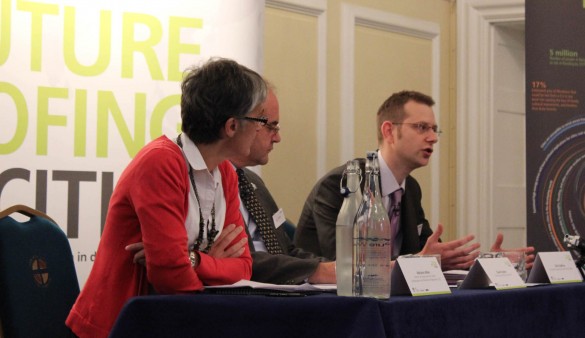
Photo: IMG_1545b-585×338
New report highlights environmental risks for cities
28 November 2012
by Richard Forster
A new report launched today sets out practical measures for cities to manage the risks from climate hazards, resource scarcities and damage to eco-systems.
The Future Proofing Cities report assesses the risks from 129 cities from Africa and Asia. These include large cities like Bangkok to smaller ones like Zaria, Nigeria. Produced jointly by Atkins, an engineering and design consultancy, the UK Department for International Development and University College London, the report outlines 100 practical policy options relevant to different types of cities.
“We found that there were a number of gaps in the knowledge of the complex challenges facing cities in the developing world,” said Nick Godfrey, economist from Atkins and lead author of the report. “We wanted to provide a holistic look at the full range of environmental risks facing cities.”
Godfrey, speaking to Cities Today after the launch of the report this morning, said that while there was already an abundance of reports and handbooks available, only Future Proofing Cities provides a more tailored guidance with pragmatic solutions for cities.
“There has been inadequate attention looking at policy solutions that not only identify the environmental benefits in addressing issues such as climate change or carbon emissions, but also solutions to identify what they can deliver in terms of economic and social benefits, including job creation and their impacts on the urban core,” he added.
The report includes five case studies from Bangalore, Maputo, Karachi, Bangkok and Nairobi that highlight the fact that many cities are already taking action to ‘future proof’ themselves.
While praising the consortium of international finance institutions and multilateral banks that agreed during Rio+20 in June to provide US$175 billion in funding for sustainable transport in cities over the next 10 years, the report calls for more investment and innovative financial mechanisms at the city level to provide investment for infrastructure.
Although the report leaves out Latin America, Godfrey says that this could be expanded upon in the future.
“What is important is that although it covers cities in Africa and Asia, the approach advocated in the report to ‘future proofing’ is more universally applicable, not only to cities in fast growing countries, but also more broadly to cities in Latin America, Europe, and North America.”
As well as the 100 policy solutions, Future Proofing Cities includes seven recommendations to carry the momentum forward for risk awareness. These include undertaking urban risk diagnostics, strengthening the capacity of urban governance, planning and delivery systems, and identifying risks to existing and planned investment portfolios.










